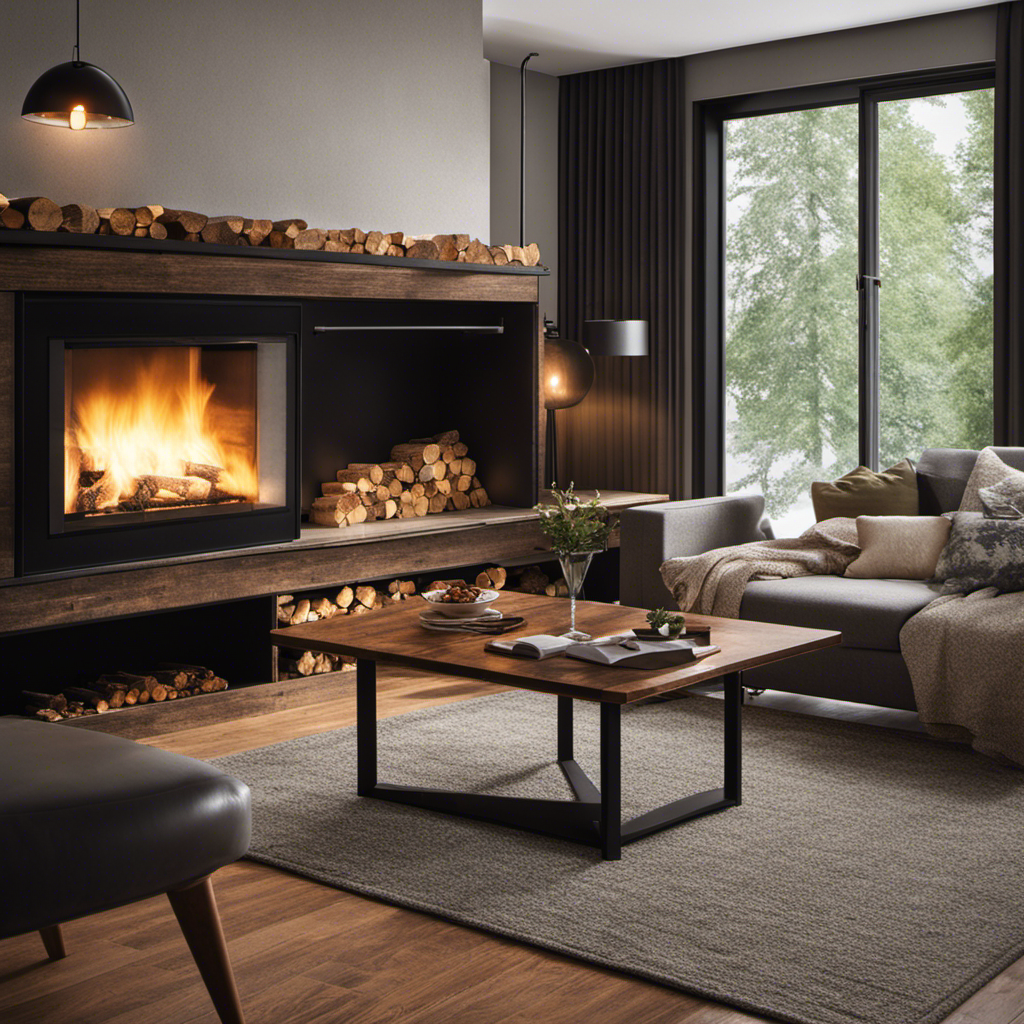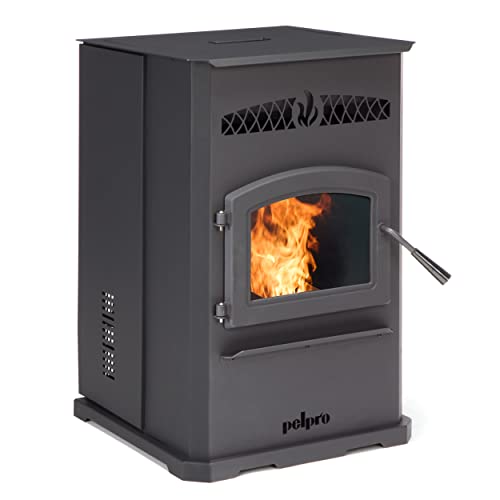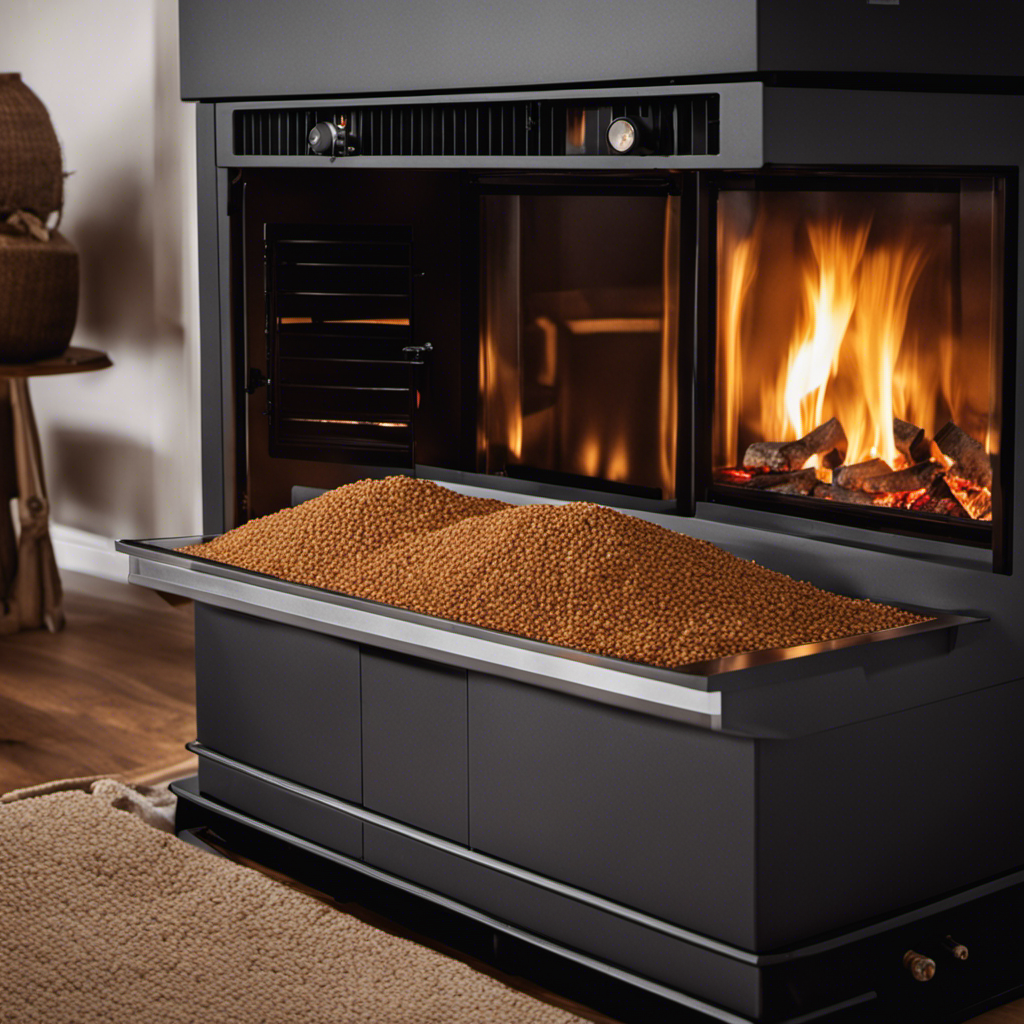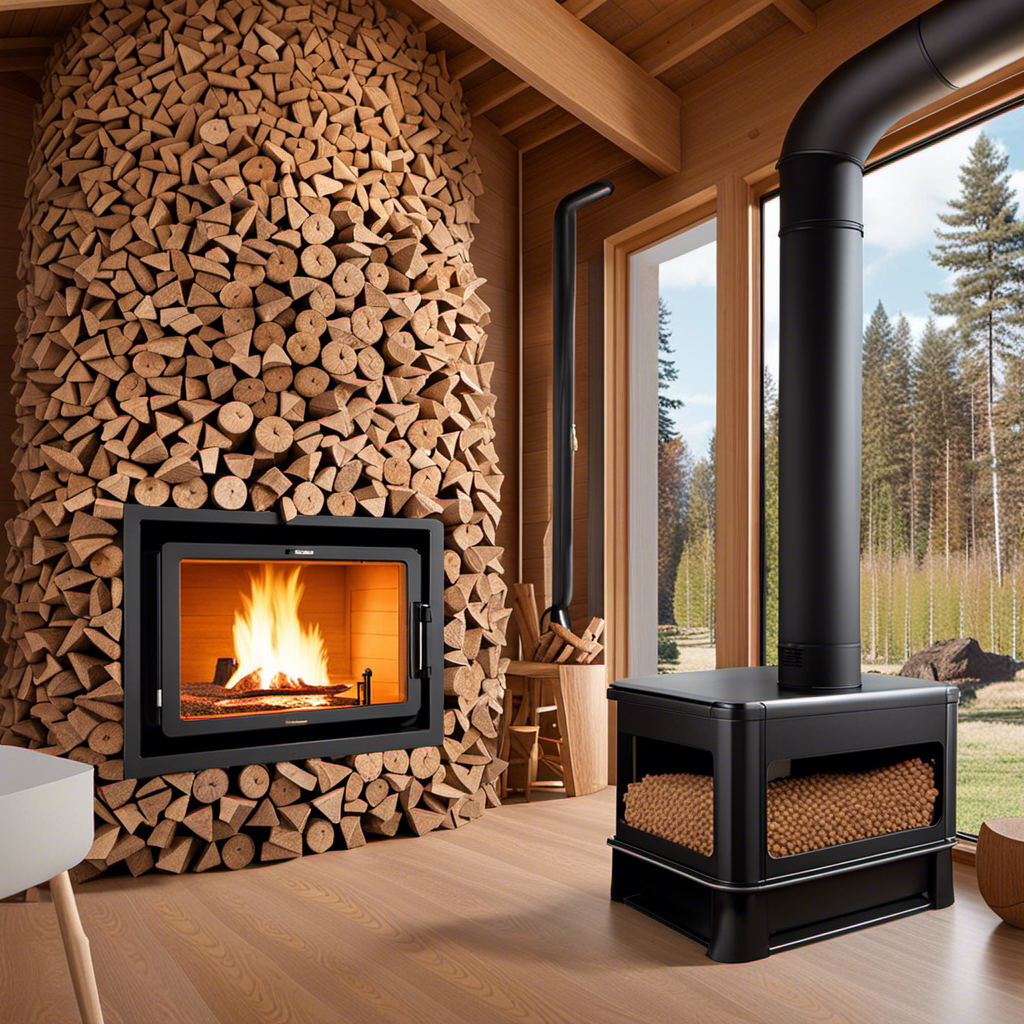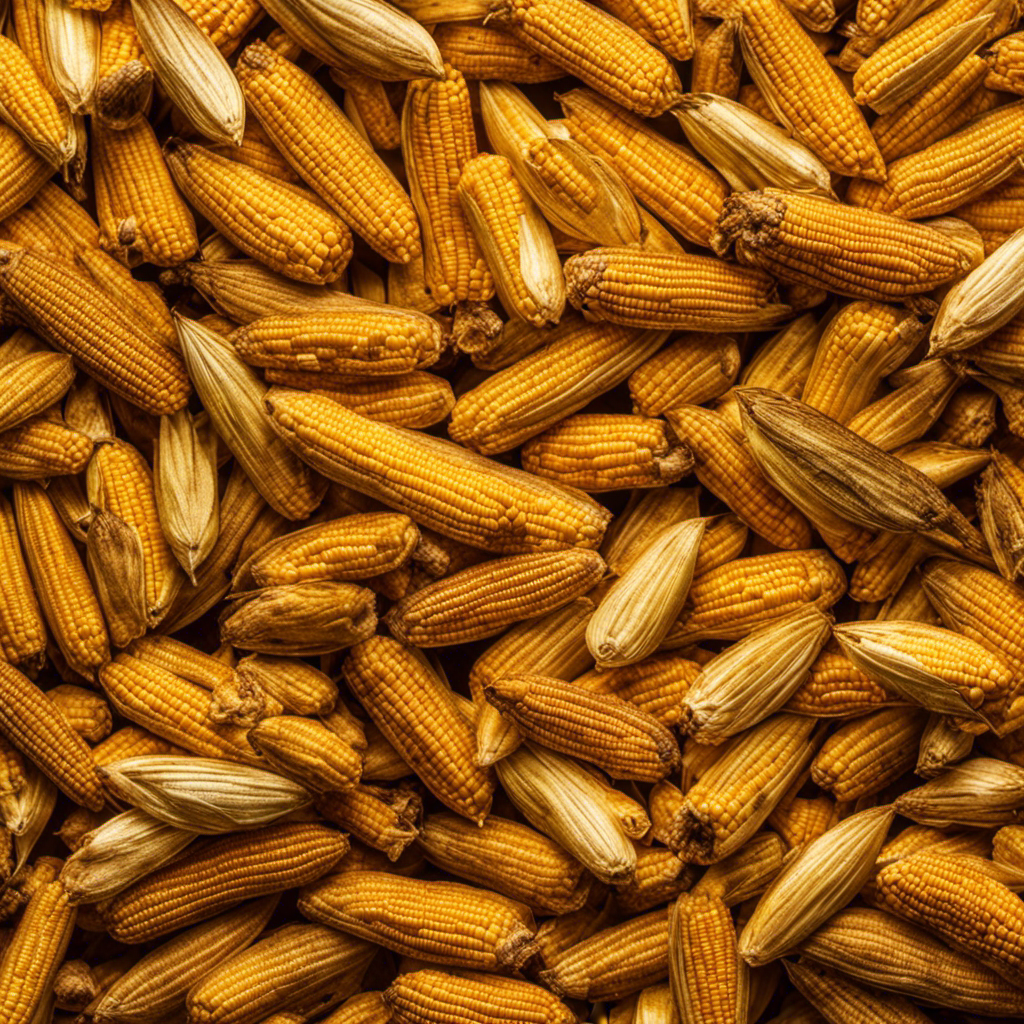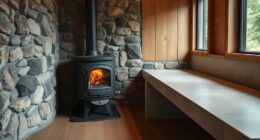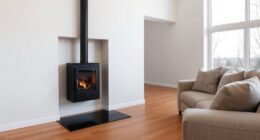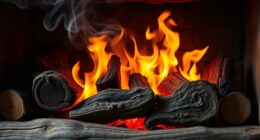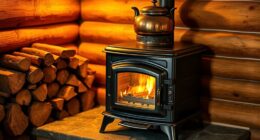Having a wood pellet stove in my home, it was unexpected to learn that 80% of wood pellet stove users encounter noise problems with their devices. This problem can be annoying and interfere with the tranquility of your living space.
That’s why I’ve written this article to help you understand the causes of wood pellet noise and provide practical solutions to reduce or eliminate it. So, if you’re tired of the clanks, hisses, and squeaks coming from your wood pellet, keep reading for expert tips and troubleshooting advice.
Key Takeaways
- Presence of foreign objects or debris in hopper or auger system can cause wood pellet noise.
- Imbalance in pellet feed rate due to improper fuel-to-air ratio can contribute to wood pellet noise.
- Misaligned or damaged agitator, clogged combustion fan, and worn-out auger motor are common causes of noise in wood pellet stoves.
- To reduce noise from wood pellet furnaces, soundproofing options, regular cleaning, checking for debris or obstructions, proper alignment and lubrication, and inspecting exhaust pipe are recommended.
Understanding the Causes of Wood Pellet Noise
If your wood pellet is making noise, it could be due to a number of possible causes. Understanding the causes of wood pellet noise is crucial for troubleshooting and resolving the issue.
One common cause is the presence of foreign objects or debris in the hopper or auger system. This can lead to mechanical friction and result in noise during pellet movement.
Another possible cause is an imbalance in the pellet feed rate, which can occur when the fuel-to-air ratio is not properly adjusted. This can cause the pellets to burn unevenly and produce noise.
Additionally, worn or damaged components such as bearings or motors can also contribute to noise.
By identifying and addressing these causes, you can effectively troubleshoot wood pellet noise and ensure optimal performance of your stove.
Now, let’s delve into the common noise issues with wood pellet stoves.
Common Noise Issues With Wood Pellet Stoves
You may experience common noise issues with your wood pellet stove. Understanding the causes of wood pellet noise is crucial for troubleshooting noisy wood pellet stoves.
One common cause of noise is the agitator, which can become misaligned or damaged over time. This can result in a rattling or clanging sound.
Another culprit is the combustion fan, which may become clogged with debris or suffer from motor issues, leading to a loud humming or screeching noise.
Additionally, a worn-out auger motor can cause a grinding or squeaking sound as it struggles to feed pellets into the burn pot.
Identifying Abnormal Sounds in Wood Pellet Burners
Identifying abnormal sounds in wood pellet burners can help pinpoint specific issues and take appropriate action to resolve them. When troubleshooting noisy wood pellet burners, it is essential to understand the different sounds they can produce.
One common abnormal sound is a loud banging noise, which could indicate a problem with the auger or the hopper. Another sound to be wary of is a high-pitched squealing noise, which may suggest a faulty fan or motor. Additionally, a rumbling or vibrating noise could be a sign of improper combustion or a dirty burner.
To maintain a quiet wood pellet stove, regular cleaning and maintenance are crucial. This includes cleaning the stove’s components, such as the burn pot and heat exchanger, and ensuring proper airflow.
By promptly identifying and addressing abnormal sounds, you can ensure the longevity and efficient operation of your wood pellet burner.
Transitioning into the subsequent section about troubleshooting noisy wood pellet grills, it is important to note that similar principles apply when diagnosing and resolving issues with these appliances.
Troubleshooting Noisy Wood Pellet Grills
When troubleshooting noisy wood pellet grills, it’s important to understand the different sounds they can produce and how to address them. Wood pellet grills can make various noises, which can be indicative of specific issues. Here are some common sounds and their potential causes:
- Grinding or squeaking noise: This could indicate a problem with the auger or motor. Check for any obstructions or worn-out components that may need replacement.
- Rattling noise: Loose parts, such as drip trays or grates, can cause rattling sounds. Ensure all components are securely fastened.
- Popping or cracking noise: This is typically normal and occurs as the wood pellets burn and expand. However, excessive popping or cracking may indicate a build-up of ash or debris that needs to be cleaned.
Reducing noise from wood pellet furnaces is essential for optimal performance and a more enjoyable grilling experience. Now, let’s explore how to achieve a quieter operation without compromising on functionality.
How to Reduce Noise From Wood Pellet Furnaces
To achieve a quieter operation from your wood pellet furnace, there are several steps you can take. Reducing noise in wood pellet furnaces is essential for a peaceful and comfortable environment. One effective method is soundproofing the wood pellet burners. By implementing soundproofing techniques, you can minimize the noise produced by the furnace and enjoy a more serene atmosphere. Here are some soundproofing options that can be considered:
| Soundproofing Material | Description | Benefits |
|---|---|---|
| Acoustic Foam Panels | Absorbs sound waves and reduces echo | Reduces noise levels significantly |
| Mass Loaded Vinyl | Adds mass to surfaces and blocks sound | Provides excellent sound insulation |
| Weatherstripping | Seals gaps and prevents sound leakage | Enhances soundproofing effectiveness |
Tips for Quieting Noisy Wood Pellet Boilers
Reducing noise from wood pellet furnaces is crucial for a more peaceful and comfortable environment. Now, let’s dive into some tips for maintaining and troubleshooting noisy wood pellet boilers.
Here are a few expert suggestions to help quiet those bothersome sounds:
- Clean the burn pot and heat exchanger regularly to prevent buildup that can cause rattling or grinding noises.
- Check the combustion blower for any debris or obstructions that may be causing vibrations or humming sounds.
- Ensure the auger is properly aligned and lubricated to avoid squeaking or screeching noises.
- Inspect the exhaust pipe for any loose fittings or gaps that may be creating whistling or hissing sounds.
By following these maintenance and troubleshooting tips, you can effectively address the noise issues in your wood pellet boiler.
Now, let’s move on to dealing with squeaky wood pellet hoppers.
Dealing With Squeaky Wood Pellet Hoppers
One way to address squeaky wood pellet hoppers is by applying lubricant to the moving parts. The hopper, which holds the wood pellets, can often be the culprit when dealing with noisy pellet stoves. Over time, the moving parts within the hopper may become dry and start to squeak. This can be resolved by applying lubricant to the affected areas. Simply spray or apply a small amount of lubricant to the hinges, gears, or any other moving parts. Make sure to use a lubricant that is safe for use in high-temperature environments.
By addressing this issue, you can reduce the noise coming from your pellet stove.
Now, let’s explore whether excessive noise is normal for wood pellet smokers.
Is Excessive Noise Normal for Wood Pellet Smokers?
If you’re experiencing excessive noise, it’s important to determine if it is normal for wood pellet smokers. Excessive noise management is a crucial aspect of maintaining the optimal performance of your wood pellet smoker.
While some noise is to be expected during operation, excessively loud or unusual noises may indicate a problem that needs attention. Excessive noise can have a significant impact on the overall performance of your wood pellet smoker, affecting temperature control, smoke production, and even the quality of the cooked food.
To prevent unwanted noise from wood pellet inserts, there are several steps you can take to ensure proper installation and maintenance. By addressing any potential issues early on, you can enjoy a quieter and more efficient wood pellet smoking experience.
Preventing Unwanted Noise From Wood Pellet Inserts
To prevent unwanted noise from your wood pellet inserts, you should regularly clean and inspect the components for any debris or obstructions. This is crucial in preventing noise pollution and maintaining the optimal performance of your wood pellet inserts.
Start by cleaning the burn pot and removing any ash buildup, as this can cause rattling or hissing sounds. Check the exhaust system for any blockages, such as bird nests or accumulated soot. Additionally, inspect the auger and motor for any signs of wear or damage that may contribute to noise.
If you have already cleaned and inspected these components but are still experiencing noise issues, consider soundproofing techniques such as adding insulation or using noise-reducing materials around the insert.
Taking these preventative measures will ensure quiet operation and a pleasant cooking experience with your wood pellet inserts.
What Are the Common Causes of Wood Pellet Stove Noise and How Can I Address Them?
When it comes to unveiling the truth about pellet stove noise, several common causes can lead to the issue. Air leaks, a malfunctioning blower, or a buildup of debris are often the culprits. Addressing these issues by sealing air leaks, repairing or replacing the blower, and cleaning out any debris can help reduce the noise.
Can Pellet Stove Noise Indicate a Problem with My Wood Pellet?
If you are hearing unusual sounds coming from your pellet stove, it could be an indication of a problem with your wood pellet. It’s important to address any issues with the fuel, as they can cause damage to your stove. Unveiling the truth about pellet stove noise can help you identify and resolve potential problems early.
Frequently Asked Questions
Can Wood Pellet Noise Be Harmful to My Health?
Wood pellet noise may not directly harm your health. However, prolonged exposure to loud noise can lead to stress and sleep disturbances. To reduce potential health risks, consider using noise reduction methods such as insulation or soundproofing.
How Long Does It Typically Take for Wood Pellet Noise to Subside?
Wood pellet noise can be bothersome, but it typically subsides within a few minutes. To reduce noise, try cleaning the stove, checking for loose parts, or adjusting the feed rate. Troubleshooting methods can help resolve the issue.
Can Wood Pellet Noise Damage the Surrounding Furniture or Walls?
Wood pellet noise can be annoying, but it typically doesn’t damage furniture or walls. However, it can affect sleep quality and disturb pets. It’s important to address the noise issue to maintain a peaceful environment.
Are There Any Safety Concerns Associated With Noisy Wood Pellet Burners?
There are safety concerns associated with noisy wood pellet burners. Excessive noise can indicate a malfunction or improper maintenance, which may lead to health impacts such as increased emissions or fire hazards.
Can I Use Any Type of Wood Pellets to Reduce Noise in My Wood Pellet Grill?
I can reduce noise in my wood pellet grill by using specific types of wood pellets. This maintenance technique has the added benefits of enhancing flavor and providing consistent temperature control.
Conclusion
In conclusion, understanding the causes of noise in wood pellet appliances is crucial for troubleshooting and finding solutions.
Common issues include fan noise, auger noise, and combustion noise.
By identifying abnormal sounds and taking appropriate measures, such as cleaning and lubricating components, noise can be reduced significantly.
Interestingly, a study conducted by the National Fire Protection Association found that 61% of wood pellet stove owners reported noise as a common problem.
Therefore, it is essential to address noise concerns to ensure a more enjoyable and peaceful experience with wood pellet appliances.

